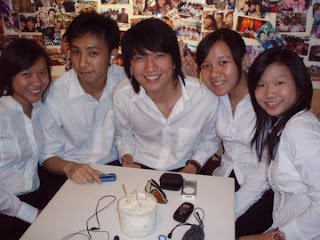Here are some pictures to 'jumpstart' this entry on group communication. What better way to show than photos with my friends:)
 My closest bunch in Ngee Ann poly. We were at Island Creamery after the Graduation Photo Shoot. Enjoying our get-together after-school sessions...like we always do.
My closest bunch in Ngee Ann poly. We were at Island Creamery after the Graduation Photo Shoot. Enjoying our get-together after-school sessions...like we always do. With my teammates from NZ, Aust, South Africa on the 1 month Taiwan trip in Dec 2008
With my teammates from NZ, Aust, South Africa on the 1 month Taiwan trip in Dec 2008
The Mauritian darlings, whom I built good friendships with in Taiwan.
Ok, now for the serious stuff.
Here is a brief overview: Our tendency to form groups is a pervasive aspect of organisational life. As well as formal groups, committees and teams, there are informal groups, cliques and cabals. So now, I'll touch on group communication in a clique(something more personal for us to relate la).
It's innate in us to identify ourselves with a particular group-think mod, edgy, the hippies, the athletics and the geek chics. Even from kindergarten, we see young children being in different cliques. And of course, communicating in their own little 'lingo' that no one else understand but themselves. Being in a group provides that sense of belonging, identity, a haven for one to seek advice, divulge secrets, plan work together. There's so many possibilities and benefits of being in a group(or in the case of the extreme, not too beneficial). Overall, group communication is essential in life-to get work done, to make friends, for socialisation.
Let me share a personal example of group communication that has lost its 'vitality'.
That is, 'phasing out with my secondary school clique'. In case you're thinking we do not hang out anymore, we actually still meet up on birthdays and special occasions like christmas(they celebrated my birthday last year and gave a surprise treat). As taught in class, I consider myself a marginal member. Not that we don't find enjoyment in each other's company, it's just that along the way after secondary school life, we made new cliques and the attachment we had back then became less significant. A weak attachment, bluntly speaking. It's hi, bye after each meeting and we go back to our own poly and jc cliques.
Then, let's sidetrack back to our hang-out cliques. It all starts with getting to know each other, then self-disclosure(recap of interpersonal communication). For me, the friends I hang out with are my pillars of strength, influence, comfort and happiness. We do think alike and analyse towards the same perspective(you could say we have the same behavioural standards after a long time together).Even our criticisms and style of doing things are almost the same. Interesting, but scary though! Hurhur.
Though group communication may seem hard to achieve(hey group communication is the root of miscommunication amplified as compared to interpersonal ones), it actually shows how well we interact with the different parties and understand them. Basically, it shows the closeness of the group. Once group communication shows signs of flaws, then you'll know it's unsuccessful.
As what Franklin Roosevelt said, " Be sincere, be brief, be seated." Now, that's what I call good group communication. How about you?

Woo hoo ! FIRST ! *spread hands over this entry*
ReplyDeleteIndeed,i had experience of phasing out from my secondary school clique as well. I think it reason is because, during our teen-hood, probably the most malleable and volatile period of our life whereby we are still exploring and building the sense of self. It is common to switch from one clique to another clique to find a place where your self belongs.
Today we see an "emo" and his friends with armful of scars and headful of rebonded hair, tighter than tight skinny jeans which stole from his sister.
5 years down the road, this 'emo' may have transcend into a businessman with his corporate peers. People change and so do the friends they make.
I believe the need to form groups stems from our instinct to survive. A normal person cant survive on their own without the help of others.
ReplyDeleteLets go back to secondary school. What if you were a loner then? Would you've been able to get to where you are now if not for their emotional and mental support as you barreled through those angst-ridden days?
Well, enough about the past. Time to look ahead into the future as we make new friends and form new experiences.
As Donald Duck used to say, "Make new friends and keep the old, one is silver, the other is gold"
I believe the need to form groups stems from our instinct to survive. A normal person cant survive on their own without the help of others.
ReplyDeleteLets go back to secondary school. What if you were a loner then? Would you've been able to get to where you are now if not for their emotional and mental support as you barreled through those angst-ridden days?
Well, enough about the past. Time to look ahead into the future as we make new friends and form new experiences.
As Donald Duck used to say, "Make new friends and keep the old, one is silver, the other is gold"
Mm... cliques are a very personal thing, I feel. Its like a support group, a place where collectively, it becomes part of your personal identity.
ReplyDeleteWe usually phase out of cliques that are forged in the formative years of our lives. As we reach Identity Achievement (according to Mary Ainsworth), we will start to phase out the ones around us that we onc thought we were similiar to, and start assimilating ourslves with the new and like-minded friends in our lives.
I think phasing out of friends and cliques starts to slow down or even die out by the time you hit 30.
Nicole Kidman once said that "Before 20, you try to collect as many friends as you can. Between 20 and 30, you identity who are really your friends. After 30, you'll learn to keep your true friends." And how right she is!!
i agree with errhhh kahlua, kalou, keru i'm sorry i don't know how to spell your name.
ReplyDeletecliques is something rather volatile to us. even cliques themselves switch identities according to the individuals in the group especially for those who are more influential.
the thing about cliques is that there are so many different variations or identities of cliques that it takes a bit of exploration and hit and miss to find which one you belong to.
but i'm more inclined to talk about those who totally do not blend in or fit into 1 clique or anything at all. there are those who transverse
throughout. constantly in search of their own identity rather than seeking validation of others for their own self gratification.
some may consider these people the outcasts on a more referential caste system. those who have no friends because they differ so greatly from everyone else.
of course most of us undergo a state of moratorium at one point of our life or another and end up with identity achievement.
but there are some who never will because that state of moratorium might be an identity achievement for them.
they might be everything and yet nothing simultaneously. sorry for the contradiction.
Hi,,
ReplyDeleteGood group communication for me is when everyone in the group feel comfortable to be part of it. Each person has equal values in that group, everyone can speak up...... No feeling of fear to express 'the real us'....
In my secondary school, as the majority is girls (so sad),, we formed a big group,, it was about 14 people.... Not all of us were so closed to each other.... Then, we ended as smaller groups, because we couldn't make a good communication in such a big group....
I think it's better to be that way,, as long as you feel comfortable in a group,, it'll be a good group for you.........
Please visit my blog,,,, :D
Thank you....
i have to agree with you that being in a clique surely gives yourself a sense of identity. whether it is a good or bad identity, is another story for another time.
ReplyDeletehowever. there are people who need no cliques. heresies such as myself. there're always exceptions to every case. i mean, i can mix well in most cliques, but i can live on perfectly well being alone too. it's only a matter of perspective.
however, for some others, the heart is closed to all outsiders. perhaps the hurt caused by someone else is too great that they're on the defensive. distancing from others may be a form of self defence. which essentially cuts down all forms of group communication to zero.
i think im being random here.